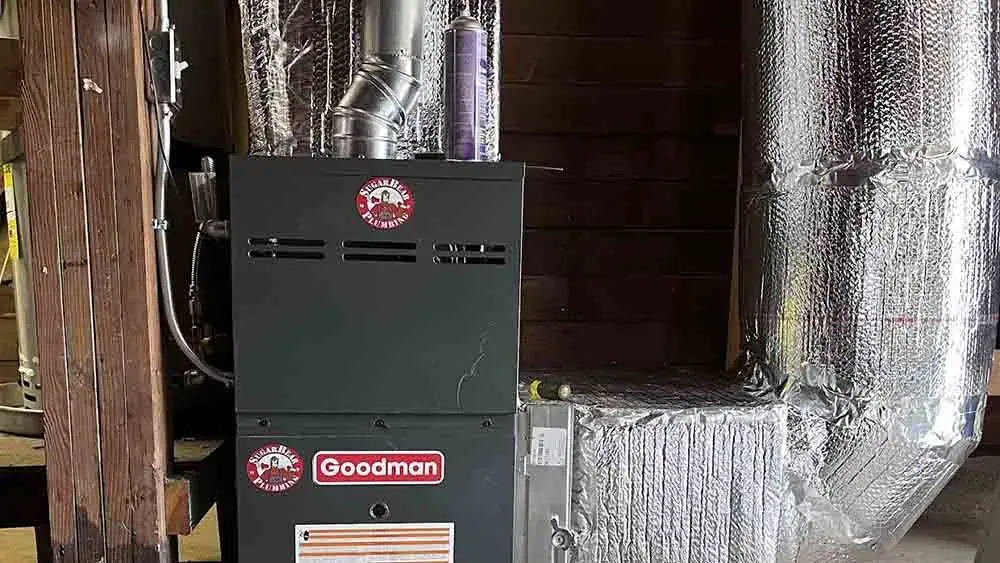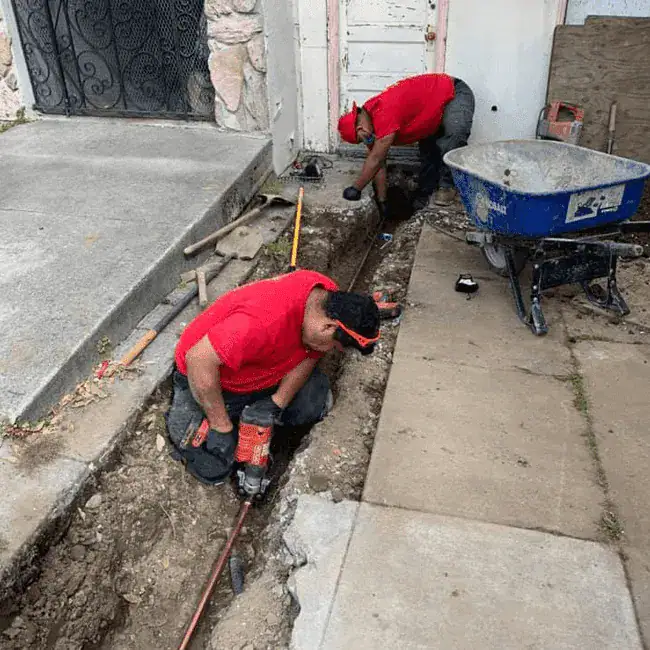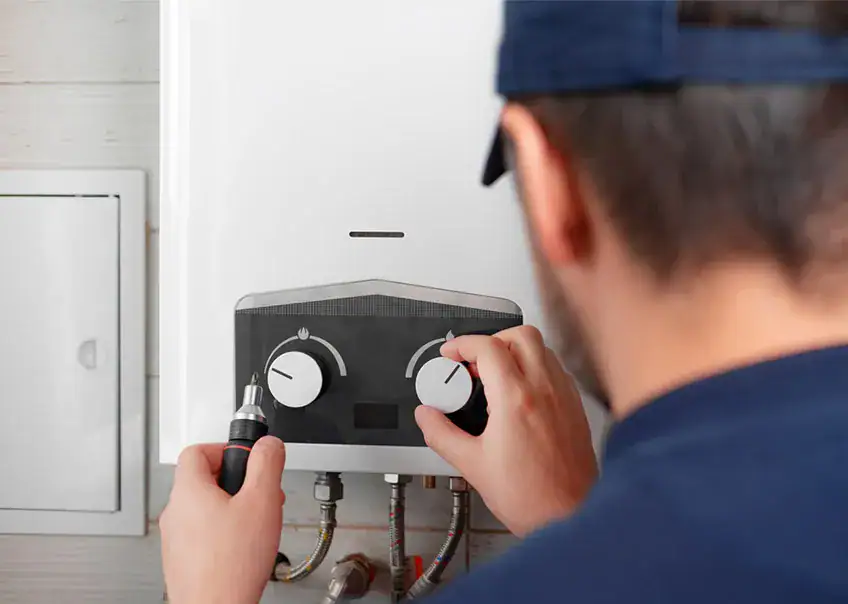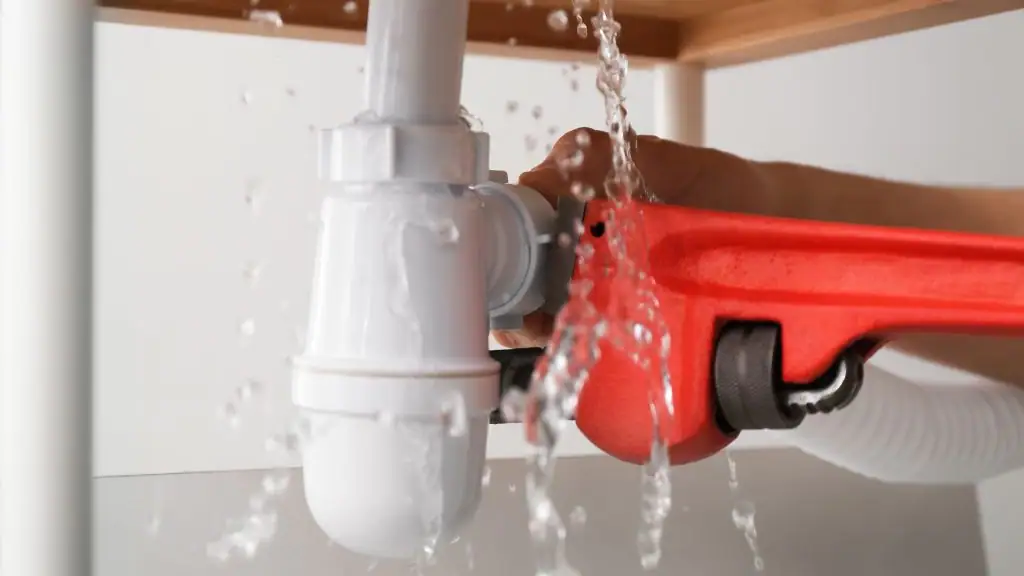Summary:
Recognizing gas leak warning signs in your San Francisco home
Gas leaks don’t always announce themselves with that distinctive rotten egg smell. While that sulfur-like odor is the most common indicator, you might also hear a hissing or whistling sound near gas appliances or see dead vegetation in your yard where gas lines run underground.
Some San Francisco homeowners notice physical symptoms first. Headaches that develop when you come home, dizziness, or nausea can signal a slow leak that’s been building up indoors. Don’t ignore these warning signs, especially if multiple family members experience similar symptoms.
The tricky part? Not all gas leaks smell. Certain conditions can cause “odor fade,” where the distinctive scent gets absorbed by soil or new piping materials, making detection harder for even experienced plumbing contractors.
Why you can't always rely on smell to detect gas leaks
Many San Francisco homeowners assume they’ll smell a gas leak immediately, but that’s not always the case. The odorant added to natural gas can fade under specific conditions, leaving you vulnerable to an undetected leak that requires professional plumbing repairs.
New steel pipes, recently installed gas lines, or underground leaks can all cause odor fade. The surrounding soil might absorb the scent, or the gas might dissipate before reaching your nose. This is particularly concerning in older San Francisco homes where gas lines may have been recently updated by local plumbing contractors.
Physical conditions affect detection too. If you have a cold, allergies, or use certain medications, your sense of smell might be compromised. Some people experience “olfactory fatigue” after prolonged exposure to the same odor, making them unable to detect even strong gas smells.
Environmental factors play a role as well. Other strong odors in your home can mask the gas smell, and outdoor leaks might not produce enough concentration to be detectable indoors. This is why gas detectors are becoming increasingly popular among San Francisco homeowners who want an extra layer of protection beyond regular plumbing services.
Even small leaks that don’t produce a noticeable smell can accumulate over time, creating dangerous conditions. The gas might pool in basements, crawl spaces, or other enclosed areas where it can reach explosive concentrations without anyone realizing there’s a problem requiring emergency plumbing repairs.
Physical symptoms that signal gas exposure in your home
Many San Francisco homeowners assume they’ll smell a gas leak immediately, but that’s not always the case. The odorant added to natural gas can fade under specific conditions, leaving you vulnerable to an undetected leak that requires professional plumbing repairs.
New steel pipes, recently installed gas lines, or underground leaks can all cause odor fade. The surrounding soil might absorb the scent, or the gas might dissipate before reaching your nose. This is particularly concerning in older San Francisco homes where gas lines may have been recently updated by local plumbing contractors.
Physical conditions affect detection too. If you have a cold, allergies, or use certain medications, your sense of smell might be compromised. Some people experience “olfactory fatigue” after prolonged exposure to the same odor, making them unable to detect even strong gas smells.
Environmental factors play a role as well. Other strong odors in your home can mask the gas smell, and outdoor leaks might not produce enough concentration to be detectable indoors. This is why gas detectors are becoming increasingly popular among San Francisco homeowners who want an extra layer of protection beyond regular plumbing services.
Even small leaks that don’t produce a noticeable smell can accumulate over time, creating dangerous conditions. The gas might pool in basements, crawl spaces, or other enclosed areas where it can reach explosive concentrations without anyone realizing there’s a problem requiring emergency plumbing repairs.
Want live answers?
Connect with a Sugar Bear Home Services expert for fast, friendly support.
Emergency steps every San Francisco homeowner must take
When you suspect a gas leak, every second counts. Your priority is getting everyone out safely, not investigating the source or trying to fix the problem yourself. The moment you detect gas or experience symptoms, switch into emergency mode and prepare to call for professional plumbing repairs.
Don’t waste time gathering belongings or trying to determine where the leak is coming from. Focus on evacuation first, safety precautions second, and calling for emergency plumbing services third. These steps can prevent a minor leak from becoming a devastating explosion.
Remember that natural gas is highly flammable and can ignite from the smallest spark. Even actions that seem harmless—like turning on a light switch or using your phone—can trigger an explosion if gas has accumulated to dangerous levels.
Immediate evacuation protocol for gas leak emergencies
The moment you suspect a gas leak, evacuate immediately. Don’t stop to investigate, gather personal items, or check other areas of the house. Get everyone out now, including pets, and move to a location at least 100 feet away from your home where you can safely call for emergency plumbing services.
As you evacuate, leave doors and windows open behind you. This allows gas to disperse outdoors rather than accumulating indoors where it could reach explosive concentrations. Don’t worry about security or weather—your immediate safety is more important than anything else while you wait for a licensed plumbing contractor to arrive.
Move quickly but don’t run. Running can create static electricity, which could potentially ignite gas vapors. Walk briskly and encourage family members to stay calm while moving away from the house. If you have elderly relatives or family members with mobility issues, assist them but don’t delay the evacuation.
Choose a meeting spot before emergencies happen. Every San Francisco family should have a predetermined location where everyone gathers during evacuations—whether for gas leaks, fires, or earthquakes. This might be across the street, at a neighbor’s house, or at the end of your block where emergency plumbing contractors can easily find you.
Don’t re-enter the house for any reason until professionals declare it safe. Many gas leak injuries occur when people go back inside to retrieve belongings or check on the situation. No possession is worth risking your life or your family’s safety before professional plumbing services can assess the danger.
Account for everyone immediately after evacuating. Make sure all family members and pets are present and accounted for. If someone is missing, inform emergency responders immediately rather than going back inside to look for them yourself.
Critical safety actions to avoid during gas leak emergencies
What you don’t do during a gas leak emergency is just as important as what you do. Certain actions that seem logical or helpful can actually trigger explosions or make the situation more dangerous for everyone involved, even before emergency plumbing contractors arrive.
Never use electrical switches, appliances, or devices of any kind. This includes light switches, phones, garage door openers, and even doorbells. Any electrical spark can ignite accumulated gas vapors, turning a manageable leak into a deadly explosion. If lights are already on, leave them on. If they’re off, leave them off.
Don’t smoke, light matches, candles, or create any open flames. This seems obvious, but stress can cloud judgment, and some people automatically reach for cigarettes or try to improve visibility with flashlights or candles. Even pilot lights on stoves or water heaters can be dangerous, so avoid those areas entirely until professional plumbing repairs are completed.
Resist the urge to find the leak source or shut off gas valves inside your home. While it might seem helpful to locate and stop the leak, this puts you in direct contact with potentially high concentrations of gas. Leave leak detection and valve shutoffs to trained professionals who have proper equipment and safety protocols for plumbing installations.
Don’t use your car if it’s parked in an attached garage or very close to your house. Starting an engine creates sparks that could ignite gas vapors. Walk to your evacuation point and use a neighbor’s phone or wait until you’re well away from the area before calling for emergency plumbing services.
Avoid creating any friction or static electricity. This means not sliding across carpets, rubbing materials together, or even removing synthetic clothing that might generate static. Natural gas can ignite from surprisingly small electrical discharges, so minimize any actions that could create sparks while waiting for a residential plumbing contractor.
Don’t attempt to ventilate the area by opening additional windows or using fans. While it might seem logical to clear gas from the house, operating electrical equipment or creating air currents could spread gas to new areas or trigger ignition sources you’re not aware of before professional plumbing services arrive.
Protecting your San Francisco family from gas leak dangers
Gas leak safety comes down to preparation, recognition, and immediate action. Know the warning signs, have an evacuation plan, and never hesitate to call for professional help when you suspect a problem. The few minutes you spend acting decisively can prevent tragedy and protect everything you value most.
Remember that gas emergencies require professional expertise to resolve safely. While you’re waiting for help to arrive, your job is simply to keep everyone safe and away from potential danger. Don’t attempt repairs or investigations—leave that to licensed plumbing contractors who have the training and equipment to handle gas leaks properly.
When you need emergency plumbing services in San Francisco, CA, Sugar Bear Home Services provides 24/7 response for gas leaks and other plumbing emergencies. We understand the urgency of gas situations and respond quickly to protect your family and property with professional plumbing repairs and installations.




